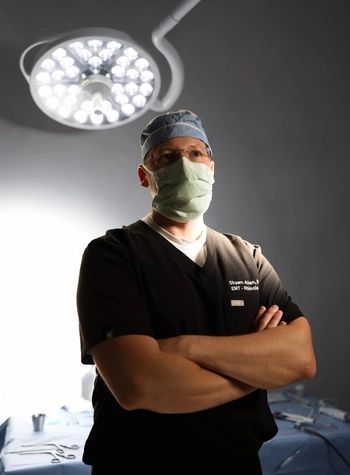Dr. Shawn Allen has either authored or reviewed and approved this content.
Page Updated:Breathe better, sleep better, feel better!
Endoscopic sinus surgery, also known as functional endoscopic sinus surgery (FESS) can provide relief for patients suffering from chronic sinus and nasal conditions. Houston-area Sinus Surgeon Dr. Shawn Allen is a Board-Certified Otolaryngologist (ENT) and fellowship-trained rhinologist with extensive experience in endoscopic sinus surgery.


There are a variety of sinus and nasal conditions that can be successfully treated with endoscopic sinus surgery, including:
In most cases, Dr. Allen will suggest non-surgical medical treatment options before recommending endoscopic sinus surgery unless these have already been attempted without success.
Endoscopic sinus surgery is designed to remove blockages from the nasal passages and clear sinus pathways and airways in order to restore optimal sinus drainage and nasal breathing functions. Surgery is visualized using an endoscope, which is a narrow rod with lenses that allow excellent visualization within the nose using an attached camera and video tower setup. Special endoscopic surgical tools are used to remove thin walls that separate the sinuses from the nasal cavities while preserving the functional lining within the sinuses and ensuring adequate room for drainage and the delivery of topical medications via nasal irrigations. Polyps and severely inflamed tissues are also removed to the extent necessary to improve sinus function. This endoscopic approach leaves no visible incisions, scars, or changes in appearance.
The first step is a consultation with Dr. Allen. He will perform an examination, review your medical history and CT findings, and discuss your concerns before reviewing treatment options with you. If endoscopic sinus surgery is recommended, he will provide detailed instructions to follow leading up to and after surgery.
Endoscopic sinus surgery is an outpatient procedure performed under general anesthesia. Dr. Allen will meet with you prior to your surgery and answer any last minute questions you may have. Surgery generally takes about 2 to 3 hours but that can vary based on the complexity of your condition. Once Dr. Allen has completed surgery he will place dissolvable packing that will aid in healing while reducing initial crusting in the nose, as well as steroid-eluting stents when appropriate. These do not significantly impact nasal breathing, which generally improves within a few days as swelling resolves.
Your recovery time can vary, but patients typically take one week off of work and other activities. Patients may notice they feel most fatigued or uncomfortable 2 to 3 days after surgery—this is normal as initial healing involves the onset of swelling and inflammation within the nose. This improves in most cases by 4 to 5 days after surgery, particularly when adhering to the post-op instructions and using nasal saline rinses appropriately. Nosebleeds are generally mild and may be more frequent for 2 or 3 days after surgery, and activity restrictions are in place for 2 weeks following sinus surgery to prevent excessive bleeding.
The best way to determine if endoscopic sinus surgery is right for you is to have a consultation with an experienced Rhinologist. If medications and other treatments have failed to resolve your sinus symptoms, surgery may be the best treatment option for you. Surgery has proven superior to ongoing medical treatment and provides lasting improvement in quality of life when impacted significantly by sinusitis.
While any surgical procedure carries some risk, endoscopic sinus surgery is known for its safety and low complication rate. In rare cases, complications can include excessive bleeding, reduced smell function, excessive eye tearing, scarring requiring revision surgery, and
Trusted Source
Functional endoscopic sinus surgery
Cleveland Clinic
Go to Source
spinal fluid leaks caused by surgery
. Dr. Allen has an excellent track record for safe sinus surgery, and can answer any questions regarding risks of surgery during your office visit.
If you suffer from anosmia (inability to smell) or hyposmia (reduced ability to smell) your
Trusted Source
Does olfactory function improve after endoscopic sinus surgery?
Litvack JR, Mace J, Smith TL
Go to Source
sense of smell can be improved
after endoscopic sinus surgery. In some cases, this smell dysfunction is caused by nerve damage and may not improve following surgery. Please discuss this further with Dr. Allen during your clinic visit to help determine how likely you are to improve smell function with surgery.
Trusted Source
Endoscopic sinus surgery
The John Hopkins University
Go to Source
Better airflow and improved breathing function
are primary goals of endoscopic sinus surgery. Dr. Allen has dedicated his career to helping people breathe easier, and always performs the exact procedures needed to achieve this outcome.

Chronic sinusitis and nasal congestion can have a negative impact on your overall quality of life. Dr. Allen can help you find relief, breathe better, and reduce your reliance on medications such as antibiotics and steroid pills. Contact us today with any questions or to schedule your appointment.
1 Cleveland Clinic. Functional endoscopic sinus surgery. Available: https://my.clevelandclinic.org/health/treatments/17478-functional-endoscopic-sinus-surgery Accessed October 26, 2022.
2 Litvack JR, Mace J, Smith TL. Does olfactory function improve after endoscopic sinus surgery? Otolaryngol Head Neck Surg. 2009 Mar;140(3):312-9. doi: 10.1016/j.otohns.2008.12.006. PMID: 19248934; PMCID: PMC2668517.
3 The John Hopkins University. Endoscopic sinus surgery. Available: https://www.hopkinsmedicine.org/health/treatment-tests-and-therapies/endoscopic-sinus-surgery Accessed October 26, 2022.
Dr. Shawn Allen has either authored or reviewed and approved this content.
Page Updated: